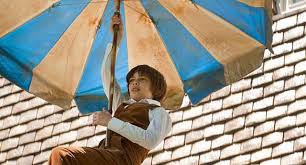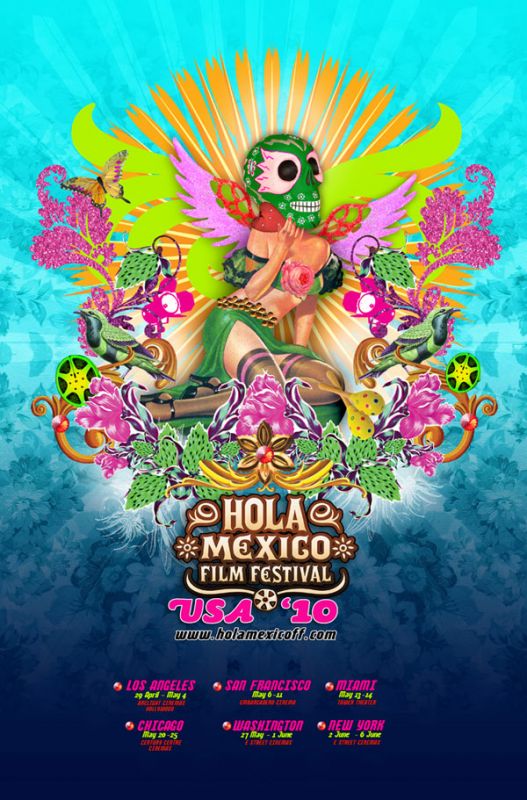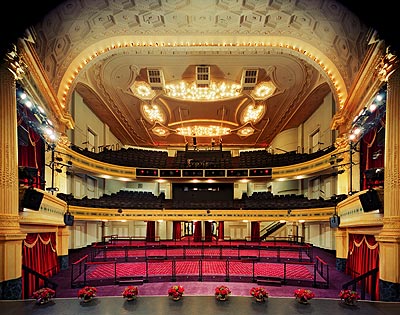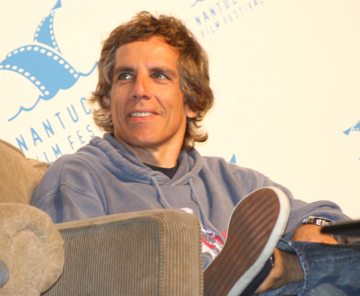
Ever wonder what it'd be like to mix coming-of-age drama, romance and comedy with action adventure, fantasy, detective mystery and tragedy -- and top it off with musical numbers and a road trip? Add caper flourishes and you have The ZigZag Kid. Belgian director Vincent Bal's genre-defying screen adaptation of Israeli author David Grossman's beloved novel is a triumph of contradictions, as is its young hero, Nono Feierberg.
Nono idealizes his dad, Holland's top police detective, yet he makes trouble even when he means to make good. Gaby, his father's secretary and girlfriend, adores Nono and believes he will find his way only when he learns about his dead mother. With his 13th birthday on the horizon, the rambunctious picaro is sent to stay with his donnish uncle. Along the way, he assumes a mission surrounding the question: "Who am I?" It will bring Nono into the orbit of a master burgler named Felix Glick, a lounge diva named Lola Ciperola (Isabella Rossellini) and a family secret. Nono's path to embracing his zigzag nature is itself one rollicking zigzag. Fortunately, Bal himself agreed to zigzag from preproduction on his next project to speak with me about this enchanting movie celebrating the freedom to be uniquely complex -- and to accept unique complexity in others.
Q: How did you come across David Grossman's book?
VB: The film's producer, Burney Bos, handed me the book. We did my previous film Miss Minoes together and we were looking for another project. I thought it was such a great story with great characters.
Q: Did Grossman give you any pointers about transposing the book from Israel to Belgium and France?
VB: Not really. One of the first things he said to us was, "To be true to the story, you have to betray the book." Once in a while he would read a draft of the screenplay and come up with very small nuances, but apart from that he gave us all the freedom we needed.
Q: Much of the film's dialogue is taken directly from the book. Were there any instances of Grossman's Israeli-bred humor that would have been lost in translation in a European context?
VB: It's hard to say. We were working on the screenplay off and on from 2004 to 2009, so at a certain point we just got into the logic of the story itself. I didn't go back to the book till one week before shooting just to get the atmosphere again.
Q: What's was the biggest challenge in structuring this genre bender?
VB: It was very difficult to structure because it doesn't start out as a story about a boy who really wants to know what happened with his mother and goes on a quest from minute 10. No, he goes on an adventure and slowly Felix wakes up the desire in him to get to know the story about his mother.
Q: Gaby brings to mind the Angel Gabriel watching over the Cherubim. How did you see her role?
VB: Gaby is the motor behind everything. Nono sets off to get these presents for Gaby because he's afraid that Gaby and his father will split up. That's Nono's main goal in the beginning, to keep them together. Then it shifts towards his mother. So it starts out as a caper movie and gets more serious. After that it's more about a boy who goes to look for his roots.
Q: How did you find a tone that worked across so many genres?
VB: The story is very complex and there are a lot of balls that you have to throw up in the beginning of the story for them to fall down later on. One thing that that really helped us was the fact that it's Nono telling the story, because that gave us the liberty to make jumps in time and also in tone. We could also use his voiceover to give humor. The story starts off as a very light adventure -- it's very humorous -- but as you get to know the characters better and they get closer to your skin, the story goes deeper and gets a little tragic. The rhythm of the film slows a little bit. It was a question of shaking the audience up in the first 10 minutes so they're ready to see whatever's coming after that.
Q: Why did you choose not to make the character 30 years older looking back, as in the novel?
VB: That adds a bit more of a nostalgic feeling. Also I thought that the film should be for children as well as for adults, and for the children I thought it's a bit more exciting to see it from the perspective of a child and not from the perspective of an adult looking back on events. We thought about the film Stand By Me, which gives a nice frame of reference, but we chose to keep it in a certain now for Nono.
Q: How does Nono's mission to crack: "Who Am I?" intersect with his quest to identify: "Who Is My Teacher (or role model)?"
VB: That's what really interested me about the story. We're all determined by our parents, but we're a totally new mix between them. Nono goes to look for who this 50 percent is in his mix, his mother. Because he doesn't know who she was, he has a hard time recognizing or acknowledging this side of himself. He tries to be as good as his father, but sometimes he feels other urges and doesn't know what to do with this. In the end what I like so much is that he realizes that he's not a mathematical mix between his mother and his father, but he's a completely new mix. He's a person who can decide what to do with his life. It's quite an optimistic view, which I thought was really touching and beautiful.
Q: At the core of The ZigZag Kid is a dark story about a mother. How did it resonate with you despite your happy childhood memories of traveling and acting in plays with your mother?
VB: My parents separated when I was 11 and my father died about two years later. When one of your parents dies when you're a kid there's always a little mystery around it. So that's what resonated with me: trying to find out who this part of my background is.
Q: How did your background in comic strips and children's illustrations help you frame the tone of The ZigZag Kid?
VB: The story is told with very short parts and with Nono saying, "Well, it was like that -- or maybe it wasn't like that," with the sort of irony that you see in comic strips. I'm not really a professional artist, but drawing helps me a lot in storyboarding and in making sketches about what I think a set should look like.
Q: Your cinematographer, Walther vanden Ende, shot the Belgian coming-of-age hit comedy Toto le héros as well as Moi, Tintin, a documentary about Belgian cartoonist Hergé, who created The Adventures of Tintin. Is there something in the Belgian soup that feeds this comic tradition, and how did it influence the film's sensibility?
VB: Walther was one of my teaches in film school. I loved his work, and Toto le héros was one of my favorite films. When I saw it, I thought, "Wow, that's the sort of tone I want to achieve in filmmaking." It's both light and funny, but at the same time there's something melancholy in there. It's really about life. On this film we didn't look so much at Toto le héros; we had already done that for Miss Minoes. One of the influences (for The ZigZag Kid) was Goodfellas. The opening five minutes was the first time I'd seen that way of narrating. And we watched some Italian films, such as the original Scent of a Woman, to see this style of the early 1970s that we were looking for.
It's true that Belgium has this history, even if you go way back to Breugel. His paintings are really like little comic strips, with very funny faces. There's something in the tradition here in drawing and the arts. If you look at the humor of Magritte, there's also something strange and funny.
Q: Did you take a page from Tintin in appealing to a broad age range?
VB: On the cover of the Tintin comic strip it used to say, "For children from 7 to 77." I think that's a good age!
Q: Did the fact that Walter shot Isabella Rossellini starrer Left Luggage help in luring her for The ZigZag Kid?
VB: Not so much. It was nice for her to see him again and they loved working together, but I had wanted Isabella Rosselli for a long time since I thought she was perfect for Lola Ciperola. I sent her some of my short films and Miss Minoes. I think she really loved the fantasy and the humor, so that made her want to join this project. We were very lucky to have her.
Q: Was the idea of casting Rossellini as lounge singer Lola Ciperola a wink to her club act in Blue Velvet?
VB: Not so much. I thought: Lola Ciperola, Isabella Rossellini -- maybe just because the names sound alike. She comes from cinema royalty, but at the same time there's always some mischief going on in her eyes and she is very funny and sweet. So I saw this double side that I saw in Lola as well: a diva but at the same time very funny.
Q: How did you come to cast Thomas Simon as Nono?
VB: We saw something like 150 boys. What I liked about Thomas is that you feel a certain tragedy behind his eyes, and I had the feeling he could carry the film. With other boys sometimes you'd get a good sentence here and there, but with Thomas we could go through whole scenes and he would understand that Nono would maybe say something but mean another thing. I had a feeling that he really got what it was about. And this was his first acting experience whatsoever.
Q: What was it about Burghart Klaussner -- who played the pastor in The White Ribbon -- that made you think: master burglar Felix Glick?
VB: In The White Ribbon and other films you could obviously see that he's a fantastic actor. At first we thought of casting a Belgian or Dutch actor for this role, but I really liked the accent that Felix Glick has in the book, so for me it would sound a little fake if a Belgian actor would play with this accent all of sudden. We thought, "Well, German and Dutch are pretty close." So we were looking at the German actors and we thought about Burghart. And then I saw a YouTube film where he sings songs by Charles Trenet. You see a different side of Burghart, very swinging and with a little champagne twinkle in his eyes. Then one of our producers met him at the Berlin Film Festival and she started talking to him. He answered in Dutch because apparently his wife is Dutch. So it was meant to be.
Q: Let's talk about the money shot: the chocolate vat scene.
VB: When I read it in the novel, I thought, "I have to do this film." It's so over-the-top! It's so Fellini! But how were we going to do it? So we found a chocolate factory where they allowed us to film. Then we built this huge vat and we put in 12,000 liters of chocolate pudding. You really could call it the money shot, because it was very expensive, but it was truly worth it. I think it's my favorite scene in the film. We couldn't bring in anything into the factory that wasn't edible. So we experimented with different textures and we found that a certain chocolate pudding mixed with hot water gave us the right substance and color, so that's what we went for. When they delivered it, it was nearly frozen. We had to shoot the next day. So the actors were wearing wet suits under their costumes. They were freezing. After two takes we had to put them under a hot shower because they were almost losing consciousness. And under these conditions they had to play a really romantic love scene!
Q: What were you going for in sending up the scores from James Bond and the British show The Avengers?
VB: The music is done by Thomas de Prins, whose band, Score Man, makes music for films that don't exist. The film has a tongue-in-cheek, swinging Pink Panthers /The Avengers kind of feel. It was the first score that Thomas had to do for a real film.
Q: How did you come to select the Hebrew lullaby that Isabella Rosselli sings to Nono, "Numi Numi"?
VB: It's not in the book. I wanted her to sing a song for him because I liked this idea that this world-famous singer also has this motherly side. I did a little research and found this "Numi Numi" song, which is for a girl. This worked for me because Lola used to sing it (for her daughter). There's a funny story about that song. We recorded it on the set. I don't speak Hebrew, so I don't understand the lyrics. Afterwards, when we were dubbing it, we saw that there were a few mistakes in the language. We could fix one or two of them, but there was another one that we couldn't fix, so at a certain point you just hear a very loud car horn outside. That's the way we fix things.
































